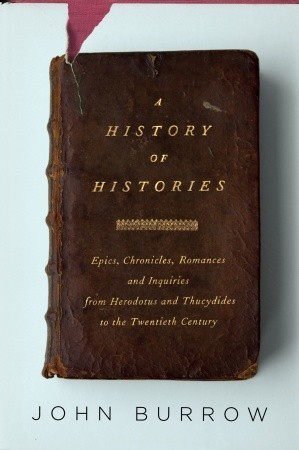Note that caveat above: "in the West." Burrow admits right up front that he only tackles Western history, since otherwise he would be speaking (writing) out of his element. I don't blame him for that. If you've spent your entire career specializing in European history, attempting a layman's explanation of African or Asian history is not going to end well. It does make me wish for an equivalent book in those fields and on those subjects; I'll have to nose around Amazon to see what's out there.
The picture Burrow paints is not one of history as such, but rather of the people writing history. In other words, you're not going to learn all of the history you should have learned in high school (or forgot from high school) (guilty). If you want that out of the book, you should probably consult one of the many texts Burrow lists at the end of the book, which includes all of the works he discusses and many that he doesn't. They're all conveniently categorized by era and topic, so if there's a time period in particular you're curious about it's easy to find. I love books that recommend more books!
That said, in a way A History of Histories can still function as a good European history primer. Because it's about historians and historical texts, out of necessity Burrow has to take a very generalized, big picture view of trends and events. I can see how many people would find that kind of framing helpful before diving into more specific, specialized areas.
It's still heavy lifting, though. Burrow's writing, while totally lucid, is also incredibly dense and intricate, which makes skimming difficult. He was also English and (naturally) the book lingers a lot on all of the English history Americans like myself never properly learn in school (in favor of endless iterations of The Federalist Papers and The Stamp Act and The Civil War). Not a problem if you're English or familiar with English history; not even a problem if you're not, except that those sections of the book will deal with events and figures not intuitively familiar to you.
Maybe not a light-hearted beach read, but it's perfect for those of you who are still snowed in!


Thanks for reading The CataLyst Katherine! I know, our surroundings affect us so much and what we see (or don’t see rather) does have an impact on both our conscious and subconscious.
ReplyDeleteHopefully those of us who are already in the world of STEM can step up and show that it is an inclusive place for women too!
That does sound interesting, thanks.
ReplyDeleteThis thing about skim-reading: the thing I've learned most from my book club is that other people tend to skim books instead of reading them. I find I can't really do that with books; I tend to either read or just float my eyes along the page without absorbing anything at all, whereas skimming is somewhere in between - I can do it online, on screens. Anyways, yes, I often come away from book club meetings shaking my head for how much more would've been gotten out of a book if only it'd been read instead of skimmed.
I read kind of quickly and have decent retention, so if there's nothing to slow me down (or if I don't make a conscious effort) I will make a headlong rush into "skimming" territory. At certain points (after I had been reading for a while, or when I was tired), I was definitely doing the eye-floaty non-retaining kind of "reading." But I appreciate flexing my brain muscles with that kind of read once in a while. Keeps the little gray cells active, as my hero Poirot would say.
Delete